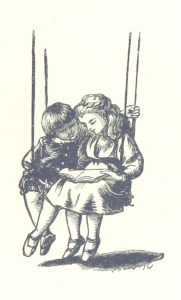In this post Anna Wray, a final year History student at the University of Nottingham and one of the student researchers on the Active Online Reading project, shares some of her reflections on what she learnt when analysing survey responses relating to collaborative reading. Anna analysed responses to our survey on staff perceptions of students’ online reading practices and on how students feel about sharing their thoughts about readings with others.
The responses that I analysed were simultaneously eye-opening and unsurprising. In general, staff feel that students are not very well prepared for studying in higher education, whether in terms of skills or attitudes, and are somewhat frustrated at their lack of engagement in reading. Students seem to feel overwhelmed and, while they enjoy peer support, often lack the confidence to contribute and gain the most from their learning.
Students were clear that peer support was (mostly) a huge help in developing their basic understanding of texts and, more importantly, in enabling them to see different viewpoints that they might never have thought of. This seems to foster a level of mutual respect and support amongst the group that could help them if they struggled with weekly readings. Collaborative reading also served as a means of reducing the weekly reading load, with which many students report struggling.
Analysis of the responses suggests that there is a need to prepare students to engage more effectively in academic reading. Lack of confidence in a topic or ‘imposter syndrome’ are not conducive to the engagement expected in higher education. In future, it would make sense to devote more attention to settling students into a new institution and gradually introducing tasks – including in reading – to increase their confidence in new learning style. This might help to ease lecturers’ frustrations if students had more confidence and engaged more with their reading.

The ability of some online reading tools and platforms to promote asynchronous connection with peers was popular with many students. Some lecturers also noted better engagement when such tools were used. It seems that, for some students, the ‘anonymity’ (or at least physical separation in a digital ‘safe space’) of such digital tools can promote participation.
However, this does raise the issue of digital poverty and accessibility mentioned in other recent blog posts from my fellow student researchers. Many students simply do not have access to the best kit or fast Wi-Fi, creating barriers to engagement with online learning. Beyond digital poverty, there is a need to ensure that students have developed sufficient levels of digital skills to be able to engage effectively. Here reading is clearly related to a wide range of other challenges relating to skills and access to technology.
Although many students benefit from reading collaboratively online, some lack the confidence, skills, and tools to engage actively and consistently. This is a shame because peer learning has many benefits beyond developing understanding of content and academic skills, such as building confidence and fostering a caring environment where friends can be made.